|
|
|
Sort Order |
|
|
|
Items / Page
|
|
|
|
|
|
|
| Srl | Item |
| 1 |
ID:
137334
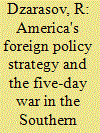

|
|
|
|
|
| Summary/Abstract |
CRIMEA WAS UNIFIED with Russia so fast that the U.S. intelligence community was caught unawares. According to the normally well-informed The Wall Street Journal, "the Obama administration is 'very nervous,' says a person close to the discussions. 'This is uncharted territory'."1 This was more than a one-time failure to predict what the Russian special services had been planning: it was a huge political flop of American strategy in Ukraine. Russia demonstrated that the degree of its readiness to stand opposed to any challenges of the West was unprecedented since the end of the Cold War, something what the United States did not expect.
|
|
|
|
|
|
|
|
|
|
|
|
|
|
|
|
| 2 |
ID:
058851
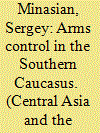

|
|
|
| 3 |
ID:
134134
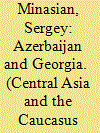

|
|
|
|
|
| Publication |
2014.
|
| Summary/Abstract |
The relations between Georgia and Azerbaijan are a key factor in regional politics and security in the Southern Caucasus. They strongly affect economic contacts and trade, as well as the implementation of all sorts of communication and energy projects. The two countries agree on many issues of regional policy, the way ethnopolitical conflicts should be settled, and the degree to which external actors could or should be involved. Turkey's presence in bilateral Georgian-Azeri relations is another important factor that may end in a geopolitical triangle of sorts in the Southern Caucasus. On the other hand, these relations cannot and should not be described as a formalized full-scale political, let alone, military-political alliance with corresponding mutual obligations. The author discusses these and other aspects of bilateral relations, assesses the prospects for further cooperation, and points to the possible challenges and problems that might crop up later.
|
|
|
|
|
|
|
|
|
|
|
|
|
|
|
|
| 4 |
ID:
051751
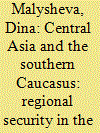

|
|
|
| 5 |
ID:
053680
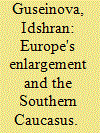

|
|
|
| 6 |
ID:
134137


|
|
|
|
|
| Publication |
2014.
|
| Summary/Abstract |
The recent geopolitical events, and primarily those unfolding along the West-Russia trajectory, have dramatically changed the forecast of how long the EU can continue using Russian energy resources. The European countries wish to slowly free themselves from their energy dependence on Russia and make new adjustments to the conceptual approaches to this problem. In particular, the EU has been actively fortifying its position in the Black Sea-Caspian Region by dividing it into two key strategic components-the Southern Caucasus and the Caspian.
The Eastern Partnership Program, which extends to Georgia, Ukraine, Azerbaijan, Moldova, Armenia, and Belarus, has implied close cooperation between these post-Soviet countries and the EU at all levels from the very beginning. The Europeans find these countries easier to understand in historical and cultural terms than the Central Asian countries.
The energy-rich countries (Azerbaijan, Turkmenistan, and Iran) and countries with considerable transit capacities (Turkey and Georgia) have found themselves in the epicenter of the European establishment's attention. At the beginning of 2014, several important new projects for the South Caucasian Region were articulated (Nabucco, Nabucco West, TAP, Shah Deniz-2, and others).
The EU is now faced with making an urgent choice between its former dependence on Russia or undertaking gradual modernization by finding new energy partners. In this respect, the most radical part of European society is willing to engage in any economically promising cooperation (in the form of low energy prices), as long as it is not with Russia or the U.S.
The rest of society holds a more moderate position in favor of diversifying suppliers; it is not against either Russian energy resources or American shale gas, but is also considering alternative energy sources.
It should be noted that, on the whole, the EU inclines more toward the second scenario.
However, after making its South Caucasian choice, the EU is not rushing to invest huge sums in the implementation of the energy projects that, as already noted, are being actively discussed by some countries of the region. Moreover, the American factor continues to play an important role: the U.S. is striving to squeeze Russia out of the European energy zone. In so doing, it is clearly striving to monopolize the European regional gas market.
|
|
|
|
|
|
|
|
|
|
|
|
|
|
|
|
| 7 |
ID:
060258
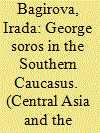

|
|
|
| 8 |
ID:
104579
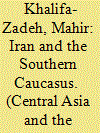

|
|
|
| 9 |
ID:
127613
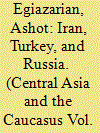

|
|
|
|
|
| Publication |
2013.
|
| Summary/Abstract |
The author discusses the semi-peripheral strategies of Iran, Turkey, and Russia in Central Asia and the Southern Caucasus, as well as their trade expansion; he establishes that the semi-periphery countries, Russia and China in particular, dominate the region's imports.
He looks at all sides of Iran's "struggle against exploitation" strategy, analyzes its impact on individual economies, and reveals the semi-peripheral function of neo-Ottomanism from the world-systems perspective.
The author's analysis of Russia's strategy allows him to conclude that after switching from mercantilism to integration with the leaders of the capitalist world-system, Russia can increase its semi-peripheral role and strengthen its position in the region.
|
|
|
|
|
|
|
|
|
|
|
|
|
|
|
|
| 10 |
ID:
068790
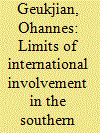

|
|
|
| 11 |
ID:
097904
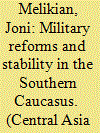

|
|
|
| 12 |
ID:
104588
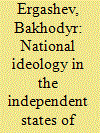

|
|
|
| 13 |
ID:
151390


|
|
|
|
|
| Summary/Abstract |
Already introduced to the academic and political debate some years ago, the concept of “security governance” still needs to be clarified. In particular, four main shortcomings need to be overcome to make the concept more useful for an assessment of current security dynamics: in the first place, attention has been devoted more to “governance” than to “security”, while failing to consider the role of the understandings and perceptions of the actors involved in the governance system. Second, the literature on the actors (governmental or not) involved is still fragmented. Third, the literature on security governance has too often been detached from reflections on regionalism, while it would be useful to further explore the relationship between cognitive definitions of regional and security dynamics. Fourth, the literature has predominantly focused on Europe and the transatlantic area, overlooking processes of “region-building” in security terms in other “unexpected” geographical spaces. After proposing avenues to overcome the current gaps in the literature, the Southern Caucasus is chosen as a case study to show the different instances of security governance emerging, thanks to definitions of the region in security terms that have involved regional and external actors, of a state and non-state nature.
|
|
|
|
|
|
|
|
|
|
|
|
|
|
|
|
| 14 |
ID:
067410
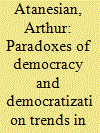

|
|
|
| 15 |
ID:
060266
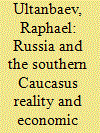

|
|
|
| 16 |
ID:
053940
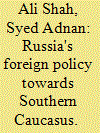

|
|
|
| 17 |
ID:
053693


|
|
|
| 18 |
ID:
118750
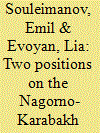

|
|
|
|
|
| Publication |
2012.
|
| Summary/Abstract |
The winter months of 2011/2012 marked the 20th anniversary of the beginning of full-scale warfare in the highlands of Nagorno-Karabakh, de jure an Azerbaijani enclave inhabited mostly by ethnic Armenians and controlled by the latter and an unrecognized republic that has essentially been claiming independence since the final days of the Soviet Union. The armed conflict in Nagorno-Karabakh and adjacent areas, which with various levels of intensity lasted from the end of the 1980s until 1994 when a ceasefire brokered by Moscow was signed, has greatly shaped the post-Soviet independence of Armenia and Azerbaijan, contributing to the long-term fragmentation of the Southern Caucasus and complicating its integration into world affairs. Indeed, the fundamentals of the regional power constellation that has endured since then were laid down at the beginning of the 1990s, with the Karabakh conflict playing a significant role in it.
|
|
|
|
|
|
|
|
|
|
|
|
|
|
|
|
| 19 |
ID:
052087
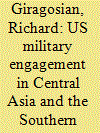

|
|
|
|
|
| Publication |
March 2004.
|
| Summary/Abstract |
The regions of Central Asia and the Southern Caucasus have each acquired an elevated strategic importance in the new security paradigm of post-September 1lth. Comprised of five states, Kazakhstan, Kyrgyzstan, Tajikistan, Turkmenistan and Uzbekistan, Central Asia's newly enhanced strategic importance stems from several other factors, ranging from trans-national threats posed by Islamic extremism, drug production and trafficking, to the geopolitical threats inherent in the region's location as a crossroads between Russia, Southwest Asia and China. Although the U.S. military presence in the region began before September 11th, the region became an important platform for the projection of U.S. military power against the Taliban in neighboring Afghanistan.
Similarly, the Southern Caucasus, commonly referred to as the Transcaucasus, has long served as a key arena for competing regional powers. For much of the past two centuries, the Transcaucasus has been hostage to the competing interests of the dominant regional actors: Russia, Turkey and Iran. And this historical legacy is matched by the realities and vulnerabilities of the current security situation in the region. The three states of the Transcaucasus, Armenia, Azerbaijan, and Georgia, each face a difficult course of economic and political reform, systemic transition and nation building in a struggle to overcome the legacy of seven decades of Soviet rule.
These two strategic regions also play important roles as "security sentries" along the front line of a dynamic U.S. engagement in response to the emergence of new non-state security threats. But both regions also face more fundamental internal challenges, ranging from an overall deficit of democracy, and the related predominance of "strongmen over statesmen," to economic mismanagement and widespread corruption. These factors significantly impede the reform efforts of these states in transition, and seriously erode the still fragile security environment. It is this set of internal factors that presents the most daunting challenge, however, as the core fragility of these states cannot be effectively overcome simply through policies relying on enhancing their security or military capabilities.
|
|
|
|
|
|
|
|
|
|
|
|
|
|
|
|
|
|
|
|
|